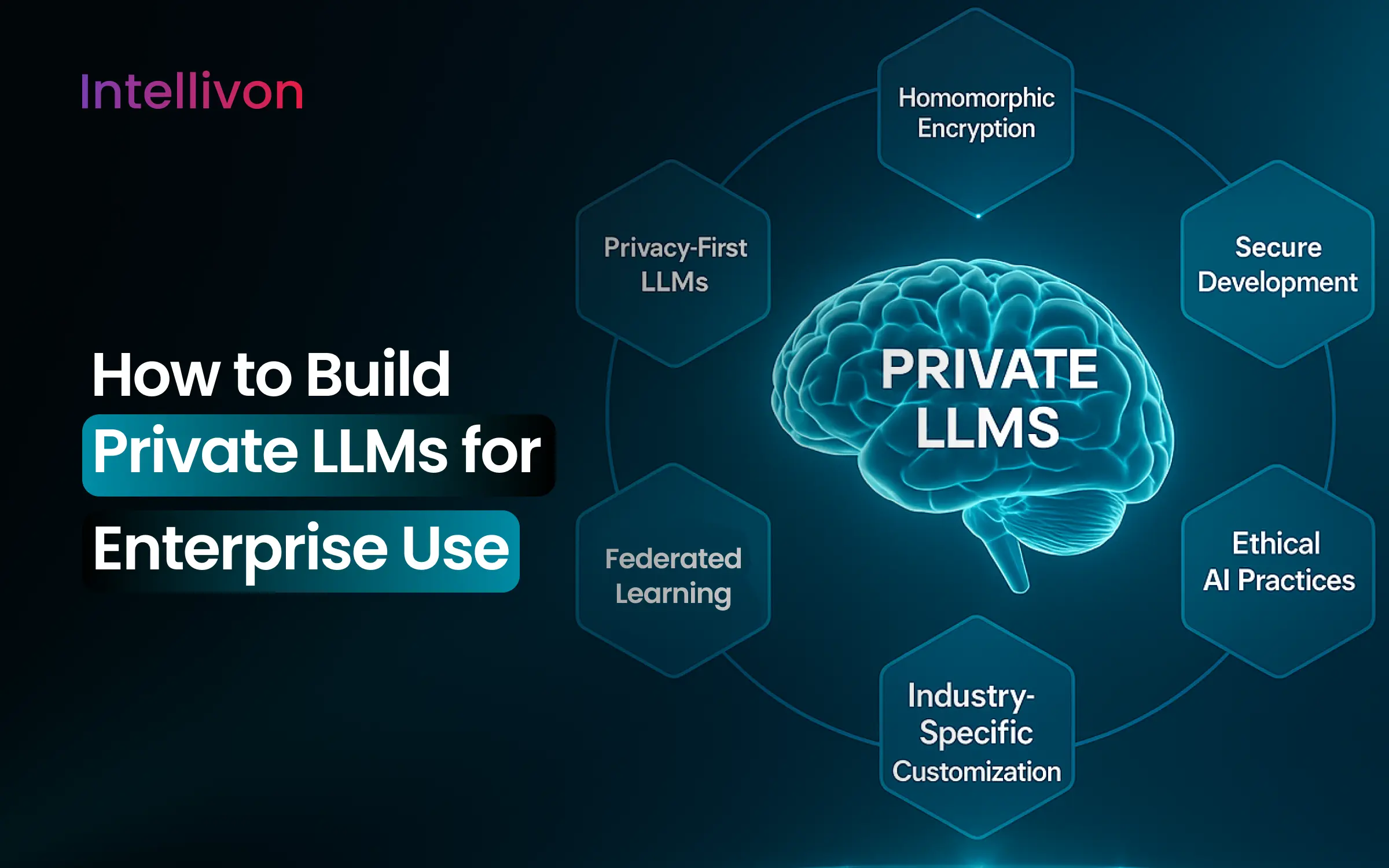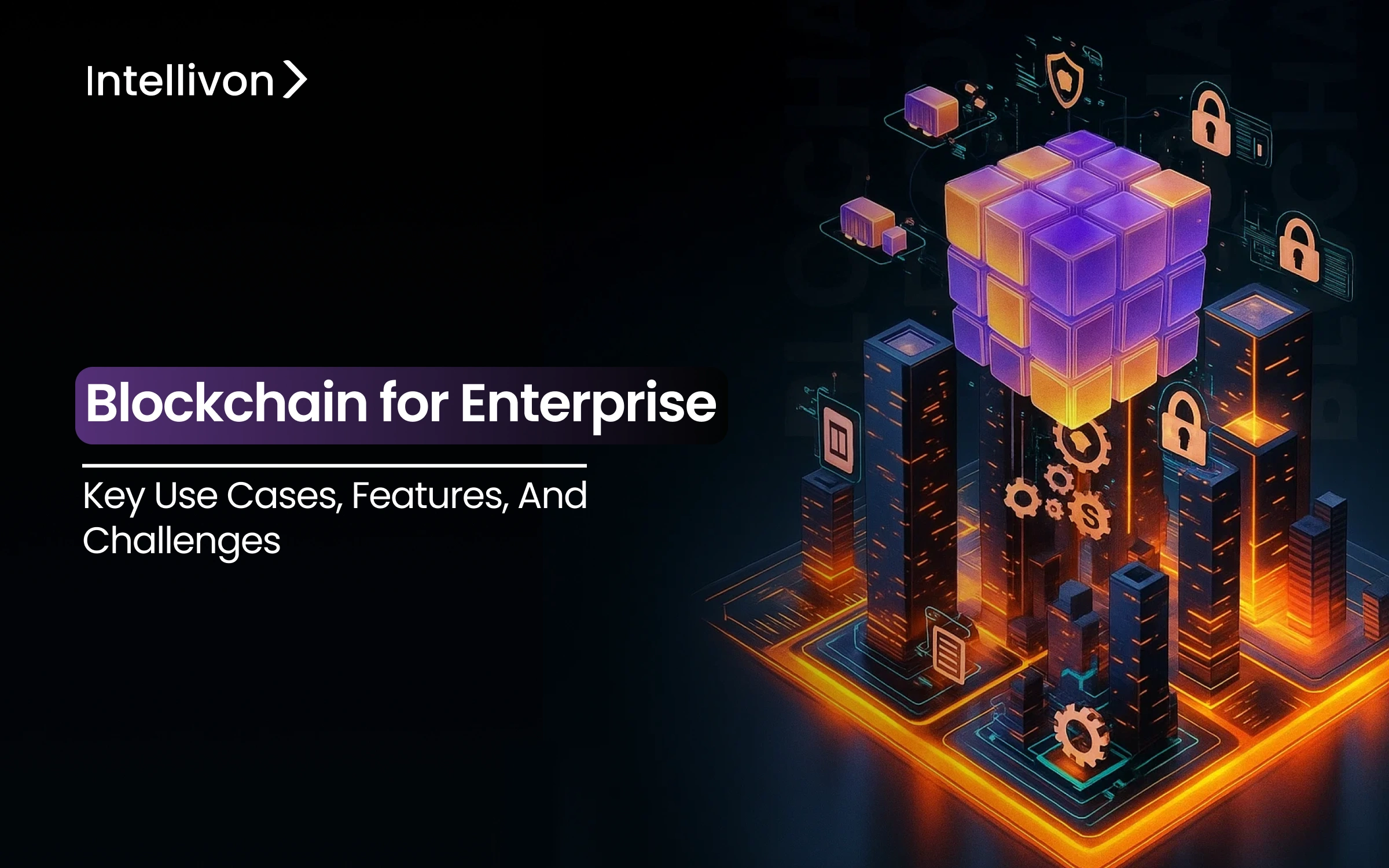Blockchain for enterprises has moved from cryptocurrency excitement to a key necessity. Today, 60% of Fortune 500 companies are actively working on blockchain projects, and this marks a 47% increase from just a year ago. This shows clear action based on real results.
Almost one in five Fortune 500 leaders see blockchain as essential to their future plans, with average implementation budgets of $5.8 million. At Intellivon, we have provided enterprises with secure, scalable blockchain solutions that fit smoothly with their current systems while staying fully compliant with regulations. This alone removes the two biggest obstacles to adoption. In this blog, we will look at real-world examples that drive measurable results, key features that set successful projects apart from failures, and major challenges to prepare for to maintain a competitive edge.
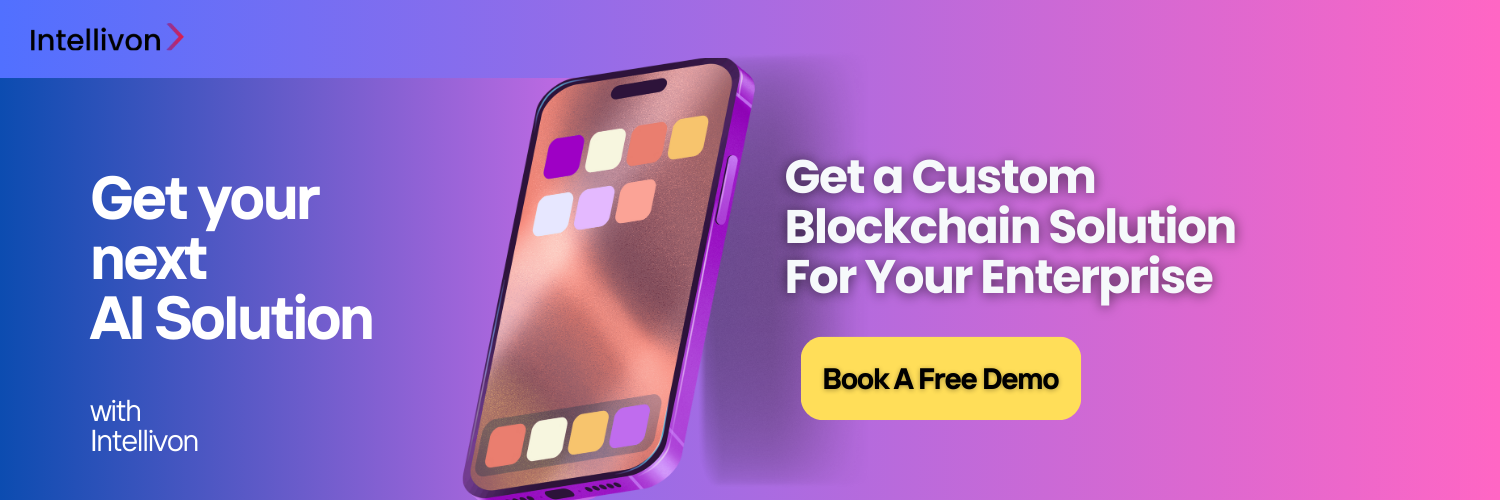
Key Takeaways of the Enterprise Blockchain Market
The global enterprise blockchain market is projected to grow from approximately USD 14.14 billion in 2024 to more than USD 213.40 billion by 2031, representing a compound annual growth rate (CAGR) of over 47%, according to market.us.
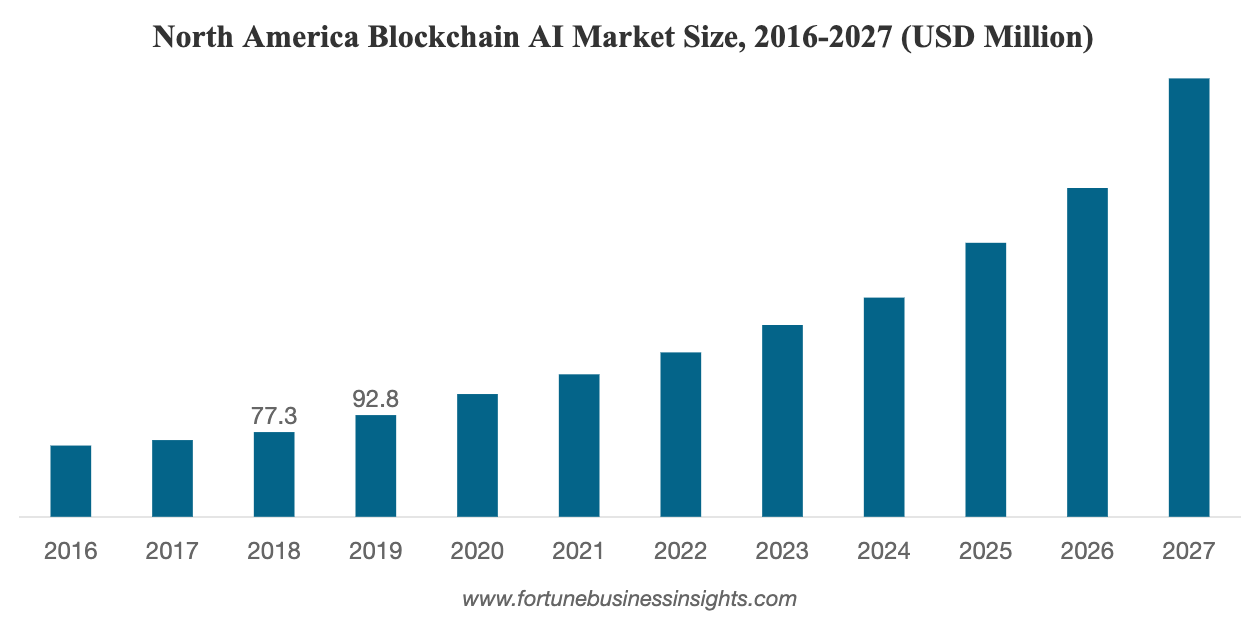
Key Growth Trends:
- Around 58% of enterprise blockchain initiatives are focused on data protection and secure information sharing, as businesses demand permissioned networks to safeguard sensitive data.
- The financial services sector leads adoption, holding more than 41% of total revenue share, with use cases in fraud prevention, transaction security, and smart contracts.
- In North America, nearly 46% of supply chain companies have already adopted or are in the process of adopting blockchain to enhance operational visibility and efficiency.
- Within healthcare, blockchain could help the industry save up to USD 100 billion per year by minimizing fraud and improving efficiency in data exchange and patient record management.
- Blockchain-powered health insurance platforms are projected to cut fraudulent claims by 75%, saving the sector approximately USD 25 billion annually.
- The average blockchain project budget for Fortune 500 firms was $5.8 million in 2023.
- Enterprises report a 41% positive ROI and 20–40% cost reductions from blockchain implementation.
For instance, Maersk, in collaboration with IBM, developed the TradeLens blockchain platform. Through TradeLens, Maersk significantly reduced processing times, administrative costs, and shipping delays, while giving all stakeholders real-time visibility into cargo movements.
Four Types of Blockchain Networks: Which One Fits Your Business?
Blockchain technology is changing industries by providing decentralized, transparent, and secure solutions. In this section, we will explain the four main types of Blockchain networks and help you determine which one suits your business best.
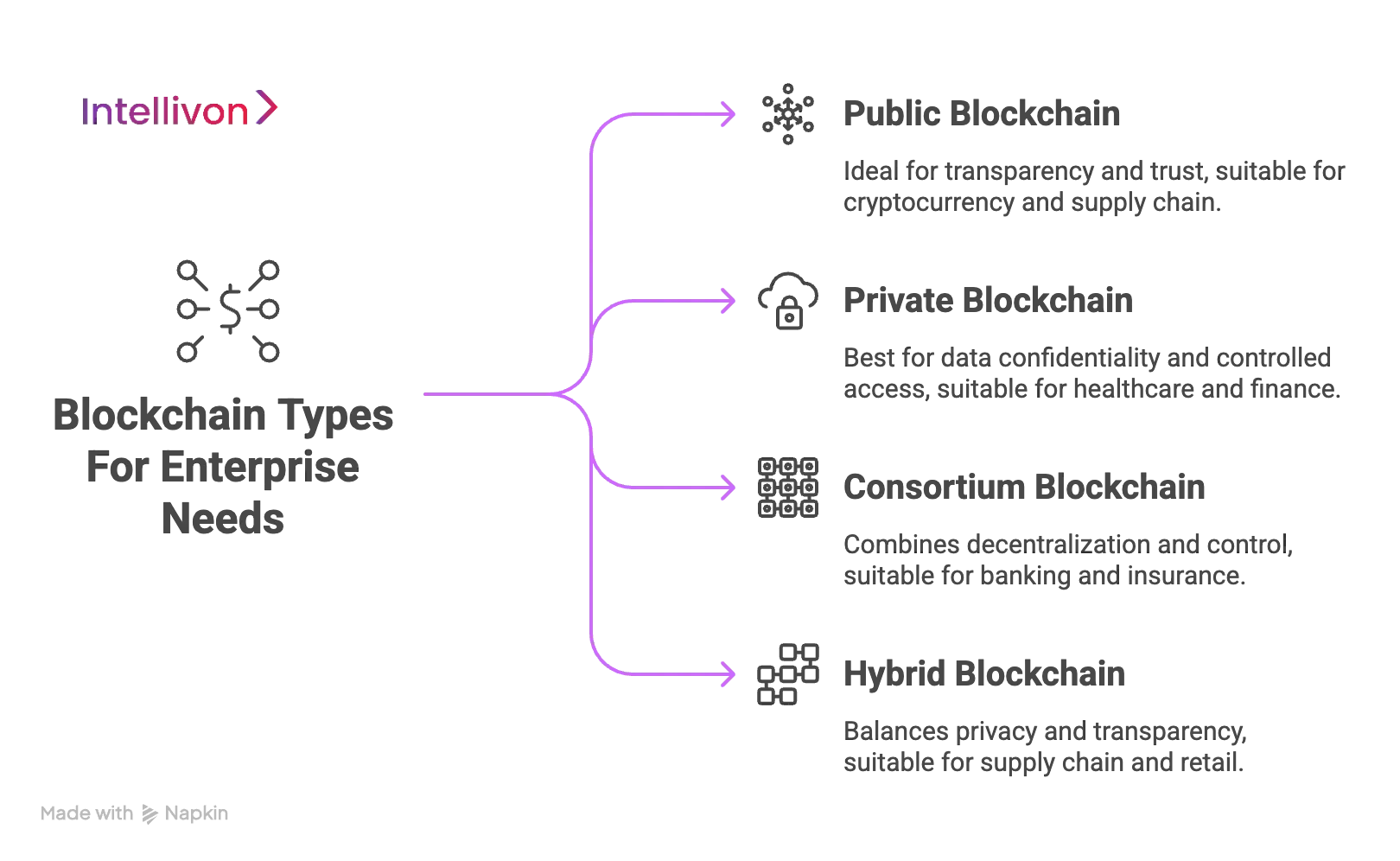
1. Public Blockchain: Open and Decentralized
Public blockchains are open networks where anyone can join, verify, or transact. They’re fully decentralized, which means no single organization has control. For enterprises, this model is useful when transparency and trust across large ecosystems are more valuable than speed or privacy.
2. Private Blockchain: Controlled Access
Private blockchains restrict access to approved participants. A single organization manages permissions and validation. Enterprises often choose this model for sensitive data protection, compliance, and full control over operations. It’s especially effective in finance, healthcare, and government use cases.
3. Consortium Blockchain: Shared Control Among Partners
A consortium blockchain, or federated model, is governed by a group of trusted organizations. This approach combines the efficiency of private systems with the fairness of decentralized oversight. It’s ideal for industries like supply chain or banking, where multiple partners must collaborate securely.
4. Hybrid Blockchain: Balancing Privacy and Transparency
Hybrid blockchains blend public and private features. Enterprises can keep critical data private while allowing public transparency for audits, trust, or customer-facing processes. It’s the best of both worlds, enabling control without sacrificing accountability.
The right choice depends on your business goals: transparency, control, collaboration, or a balance of all three.
Which Blockchain Type Fits Your Business?
| Blockchain Type | Use Cases | Best for Businesses |
| Public Blockchain | Cryptocurrencies, Supply Chain Transparency, Voting Systems | Businesses needing full transparency and decentralization, such as cryptocurrencies and public systems. |
| Private Blockchain | Financial Institutions, Healthcare, Data Privacy Management | Enterprises that require data confidentiality and centralized control, such as banks, hospitals, and private firms. |
| Consortium (Federated) Blockchain | Trade Finance, Banking Consortia, Collaborative Supply Chain | Collaborative businesses or industries with multiple stakeholders, like banking consortia or supply chain partnerships. |
| Hybrid Blockchain | Supply Chain, Digital Asset Management, Enterprise Data Storage | Enterprises needing flexibility between private data and public transparency, such as in supply chain or digital asset management. |
Key Blockchain Features for Enterprises
Blockchain offers a range of features that change how businesses operate, from securing data to automating processes and allowing trustless transactions. In this section, we will explore the main features of blockchain and explain how each one can benefit your enterprise, improving data security, operational efficiency, and accountability.
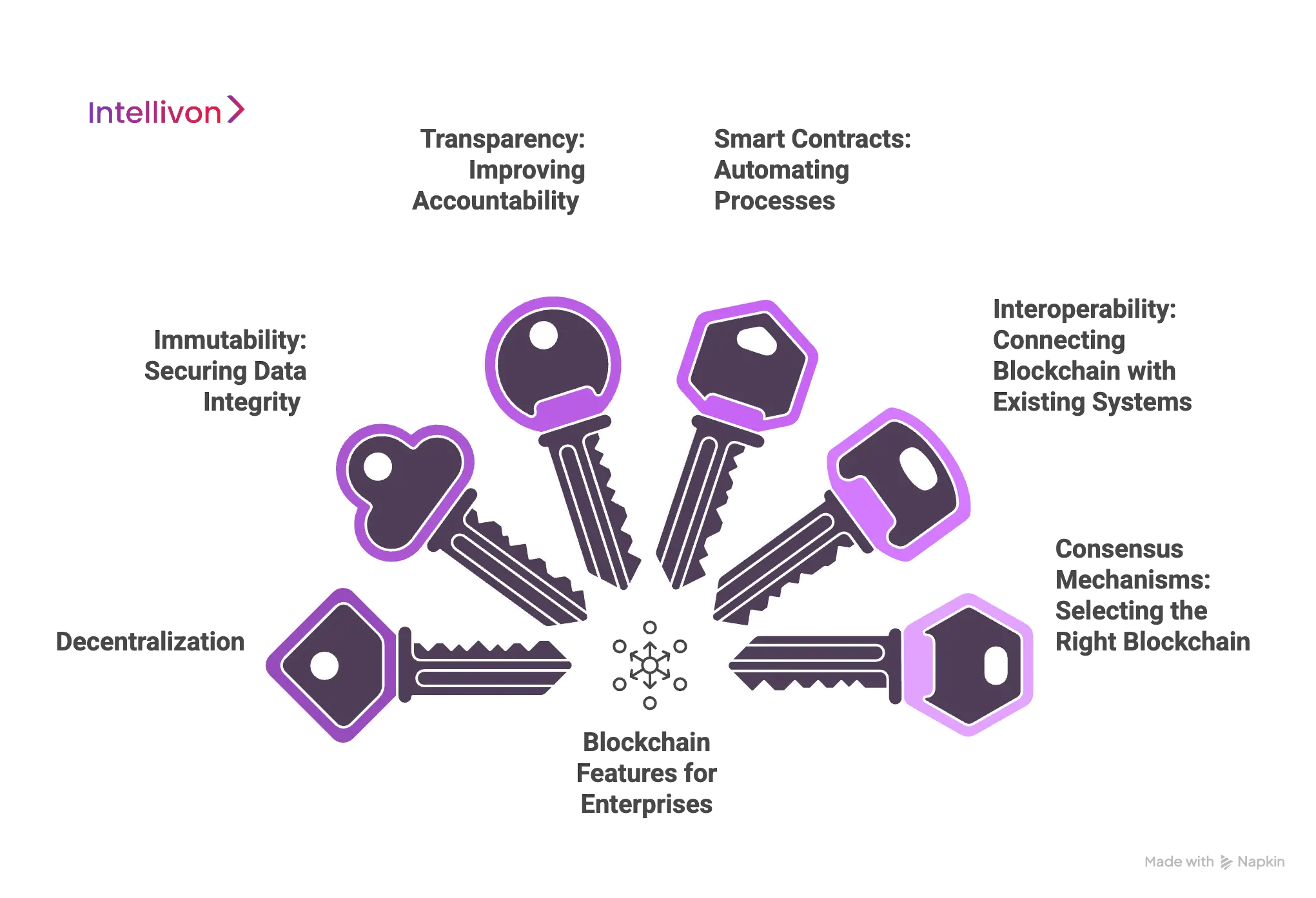
1. Decentralization
Think about how risky it is when one system or authority controls everything. If it fails, your business suffers. With blockchain, there’s no single point of failure. The system is spread across a network, so even if one part goes down, your operations keep running. For an enterprise, that means business continuity, fewer disruptions, and less dependence on outside intermediaries.
2. Immutability
In business, trust in data is non-negotiable. Once something is recorded on the blockchain, it can’t be changed or deleted. That’s powerful. It means your records are tamper-proof, reliable, and audit-ready at any time. For industries under constant regulatory pressure, this directly translates into lower compliance costs, fraud prevention, and complete peace of mind.
3. Transparency
Transparency in enterprise systems is often easier said than done. With blockchain, every participant has the same view of the data in real time. No more mismatched records or disputes about “who has the latest version.” Imagine supply chain leaders tracking a shipment from the factory floor to the store shelf — every step is visible, verified, and trusted. That kind of visibility builds accountability, strengthens relationships, and speeds up decision-making.
4. Smart Contracts
Contracts usually mean paperwork, delays, and costly middlemen. Blockchain flips that. Smart contracts are self-executing agreements that trigger automatically when conditions are met. For enterprises, this means fewer manual errors, faster deal closures, and measurable cost savings. In short: less admin, more business.
5. Interoperability
Enterprises don’t run on one system alone. You’ve got ERP, CRM, legacy platforms, all working together to keep operations moving. Instead of replacing, blockchain connects with them. That interoperability means real-time updates, secure data exchange, and smoother collaboration across your tech stack. In other words, blockchain slips into your existing ecosystem instead of forcing you to rebuild it.
6. Consensus Mechanisms
Here’s the thing: not all blockchains work the same way. Consensus mechanisms decide how transactions get verified. Some, like Proof of Work, are extremely secure but slower and energy-heavy. Others, like Proof of Stake, are faster and more cost-efficient. The key is choosing the model that fits your enterprise priorities, whether that’s scalability, energy savings, or bulletproof security. Done right, it’s about balancing performance, cost, and reliability for long-term growth.
Requirements of a Scalable Blockchain Enterprise Solution
Adopting blockchain isn’t just about keeping up with technology trends. For enterprises, it’s about choosing a solution that fits business goals, scales as you grow, and delivers real ROI. Let’s look at the essentials.
1. Privacy: Keeping Sensitive Data Safe
Not every piece of business data should be visible to everyone. That’s where permissioned blockchains come in. They let you decide who can access what, so customer records, financial transactions, or confidential contracts stay in the right hands. For industries like finance or healthcare, this is survival more than being optional.
2. Security: Building a Wall Against Cyber Threats
Cyber risks are rising, and a single breach can cost millions. Blockchain’s immutable ledger makes tampering almost impossible. Add strong key management and digital signatures, and you’ve got a system where only authorized players get through. For enterprises, that means less fraud, fewer breaches, and more trust.
3. Scalability: Preparing for Tomorrow’s Demands
Your business won’t look the same in five years, and your blockchain shouldn’t hold you back. Platforms like Hyperledger Fabric or Ethereum 2.0 are built to scale. They handle bigger transaction loads without slowing down, ensuring your system grows right alongside your operations.
4. Speed: Running at Real-Time Pace
In today’s world, waiting days for records or payments just doesn’t cut it. Enterprises need low-latency systems that run in real time. Solutions like Corda and Hyperledger Fabric make sure transactions process in seconds, not hours, so decisions and operations keep moving.
5. Smart Contracts: Cutting Out the Paperwork
Think of smart contracts as agreements that execute themselves. For enterprises, that means fewer manual errors, lower admin costs, and faster business cycles. What used to take days can now be done instantly, securely, and automatically.
6. Interoperability: Working With What You Already Have
No enterprise wants to rip and replace its IT stack. The good news? Blockchain doesn’t have to. With solutions like Blockchain-as-a-Service from AWS or Azure, your ERP, CRM, and legacy systems can plug right into blockchain networks. That means smooth adoption without disruption.
When these pieces come together ( privacy, security, scalability, speed, automation, and integration), blockchain stops being a mere experiment and becomes a real competitive advantage for enterprises.
Top Blockchain for Enterprise Platforms: Which One Is Right for You?
Choosing the right blockchain platform can feel overwhelming. The truth is, not every platform is built for enterprise needs. Some shine in finance, others in supply chain or healthcare. Here’s a breakdown of the leading platforms and how they fit into real business priorities.
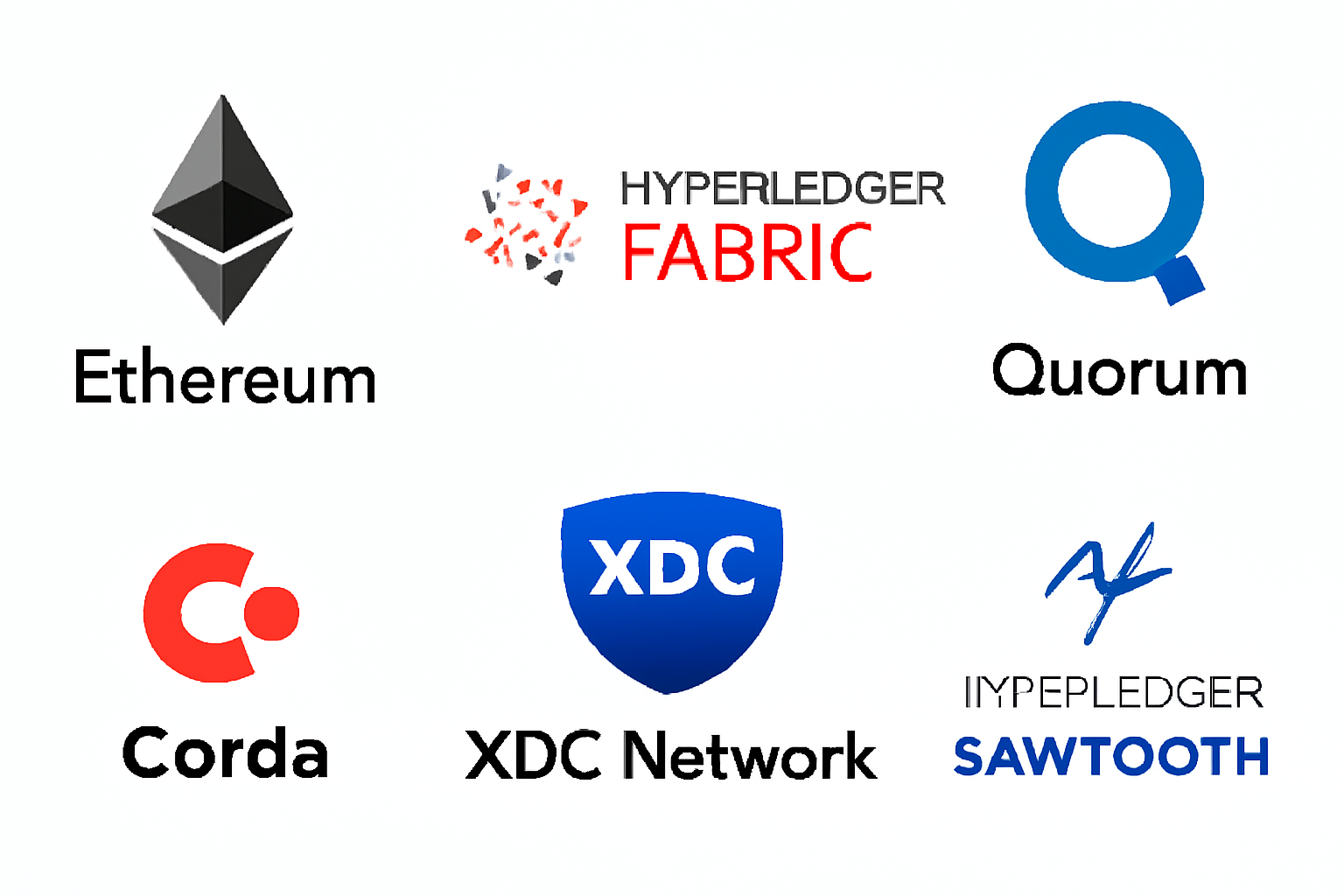
1. Ethereum: Smart Contract Pioneer
Ethereum is the most recognized blockchain for smart contracts. It powers thousands of decentralized apps.
Why enterprises use it:
- Automates workflows with smart contracts.
- Large developer community and proven reliability.
- Strong for industries needing transparency, like finance and supply chain.
Considerations:
Ethereum’s main challenge has been scalability and high transaction costs. With Ethereum 2.0 and Layer-2 solutions, many of these issues are improving.
2. Hyperledger Fabric: Private and Permissioned
Developed by the Linux Foundation, Hyperledger Fabric is built for enterprises that want privacy and control.
Why enterprises use it:
- A permissioned network keeps transactions confidential.
- Modular design allows customization for specific use cases.
- Widely adopted in supply chain, healthcare, and banking.
Considerations:
Setup is more complex than public chains. It’s ideal for companies prioritizing confidentiality over public visibility.
3. Quorum: Enterprise-Grade Ethereum
Originally developed by JPMorgan, Quorum takes Ethereum and makes it enterprise-ready.
Why enterprises use it:
- Built for financial services needing secure, private transactions.
- Inherits Ethereum’s smart contract capabilities.
- Handles higher transaction volumes efficiently.
Considerations:
While strong in finance, Quorum has a smaller developer ecosystem compared to Ethereum.
4. Corda: Finance-Focused Blockchain
Corda, from R3, is designed for financial institutions. It’s permissioned, with a focus on privacy and regulatory compliance.
Why enterprises use it:
- Private data sharing between relevant parties only.
- Smooth integration with existing IT systems.
- Trusted for regulated industries like banking, trade finance, and insurance.
Considerations:
Corda’s niche is finance. It’s less flexible for industries outside that space.
5. XDC Network: Trade Finance Specialist
XDC is built for global trade and cross-border payments. It’s fast, cost-effective, and interoperable.
Why enterprises use it:
- Low transaction costs for high-volume international trade.
- Interoperability with other blockchains.
- Designed to simplify trade finance processes.
Considerations:
Strong in trade finance, but still growing outside that niche.
6. Hyperledger Sawtooth: Flexible and Modular
Hyperledger Sawtooth is built for customization. It lets enterprises choose the consensus mechanism that fits their needs.
Why enterprises use it:
- Highly adaptable to different industries.
- Scalable for high transaction volumes.
- Good for supply chain and healthcare applications.
Considerations:
The ecosystem is smaller compared to Fabric. Deployment requires more effort.
Bottom line:
- If you need transparency and automation, Ethereum or Quorum are strong choices.
- If privacy and control matter most, Hyperledger Fabric or Corda lead the way.
- If you’re in global trade, XDC is purpose-built for you.
- For flexibility across industries, Hyperledger Sawtooth provides options.
The right platform depends on your industry, compliance needs, and growth strategy. Here is a comparison chart to provide an eagle’s eye view of the blockchain platforms so you can make an informed decision based on enterprise needs.
Enterprise Blockchain Platform Comparison
| Platform | Privacy & Control | Speed & Scalability | Costs | Best For |
| Ethereum | Public, transparent, less control | Moderate speed, improving with Ethereum 2.0 & Layer-2 | Higher transaction fees (gas costs) | Smart contracts, DeFi, supply chain transparency |
| Hyperledger Fabric | Permissioned, strong privacy | High throughput, scalable for large networks | Moderate, but requires setup expertise | Supply chain, healthcare, banking |
| Quorum | Permissioned, high privacy | Fast transactions, enterprise-grade throughput | Moderate to high | Financial services, private contracts |
| Corda | Permissioned, privacy by design | Fast, compliance-focused | Higher due to niche focus | Regulated industries: finance, insurance |
| XDC Network | Permissioned, trade-focused | High scalability, low latency | Low, cost-effective for global trade | Cross-border payments, trade finance |
| Hyperledger Sawtooth | Customizable, flexible security | Scalable, modular, adaptable | Moderate to high | Supply chain, healthcare, modular enterprise solutions |
Transformative Blockchain Use Cases for Enterprises
Blockchain is no longer just an experiment. It’s delivering measurable value across industries, from cutting transaction costs to improving product traceability. Enterprises are now using it not only to streamline operations but also to strengthen trust, reduce risk, and unlock new business models. Below are the sectors where blockchain is making the biggest enterprise impact, with real-world examples.
1. Banking and Finance
Few industries face as much pressure to modernize as banking and finance. Traditional cross-border payments can take days, involve multiple intermediaries, and rack up high fees. Blockchain flips this model by enabling direct, near-instant settlement between parties, dramatically lowering costs and improving customer experience.
Example: Ripple’s RippleNet helps Santander and PNC process payments instantly, cutting cross-border transaction costs by up to 30%. Blockchain also powers DeFi (Decentralized Finance), where platforms like Aave use smart contracts to automate lending, removing banks from the middle of simple transactions.
2. InsurTech
Insurance is notorious for inefficiencies and fraud. Customers often wait weeks for claims, while insurers lose billions to fraudulent activities. Blockchain’s immutable records reduce manipulation, while smart contracts streamline processes, giving insurers stronger oversight and customers faster service.
Example: The B3i consortium lets insurers share risk data securely, reducing fraud. Lemonade uses blockchain and AI to settle simple claims in minutes instead of weeks.
3. Retail
Modern consumers demand more than low prices. They want safety, authenticity, and proof of ethical sourcing. Blockchain provides the visibility needed by recording every step of a product’s journey. At the same time, retailers are leveraging blockchain to modernize loyalty programs with secure, fraud-proof systems.
Example: Walmart uses IBM’s Food Trust blockchain to trace produce from farm to shelf in seconds. Meanwhile, Carrefour created a blockchain-powered loyalty program to secure points and reduce fraud.
4. Supply Chain and Logistics
Global supply chains involve countless players, from manufacturers to distributors to customs agencies. The lack of a single source of truth often leads to delays, disputes, and rising costs. Blockchain introduces transparency and traceability, ensuring that every party works from the same, verified data.
Example: Maersk and IBM’s TradeLens tracks shipments in real time, cutting customs delays and paperwork. This reduces disputes and increases efficiency across the supply chain.
5. Real Estate
Property transactions are weighed down by paperwork, legal checks, and fraud risks. Blockchain makes ownership records tamper-proof and speeds up transfers by removing redundant intermediaries. For enterprises in real estate, this means lower transaction costs and faster deal cycles.
Example: In Georgia, the government digitized land registries on blockchain to secure titles. Platforms like Propy enable fully digital property transactions, reducing costs and transfer times.
6. Healthcare
The healthcare sector struggles with siloed data and strict compliance requirements. Blockchain enables secure sharing across providers, while giving patients control of their own records. This reduces medical errors, ensures privacy, and creates a seamless care experience.
Example: Medicalchain lets patients decide who can see their records. Estonia runs a national blockchain-based health record system, reducing errors and improving care coordination.
7. Manufacturing & Mobility
For industries like automotive and aerospace, part authenticity and safety are critical. Blockchain provides tamper-proof records of every component, from raw material to final product. This prevents counterfeits, supports ethical sourcing, and improves safety compliance.
Example: BMW uses blockchain to verify car parts, while Ford tracks cobalt sourcing to ensure it doesn’t come from conflict zones. Airbus explores blockchain for aircraft maintenance records, improving safety compliance.
8. Aviation
Airlines and regulators depend on accurate maintenance and flight records, yet current systems are fragmented. Blockchain secures these records, making them verifiable and accessible across stakeholders. It improves compliance, reduces downtime, and boosts passenger trust.
Example: SITA is piloting blockchain for flight data tracking, enhancing coordination between airlines, airports, and regulators.
9. Energy and Utilities
The energy sector is shifting toward decentralization, renewables, and consumer participation. Blockchain enables peer-to-peer trading of energy, improves grid efficiency, and ensures transparent sustainability tracking. For utilities, this means new revenue models and better resource management.
Example: Power Ledger lets communities trade excess solar power directly. Utilities can balance grids more efficiently, while consumers save money and support green energy.
10. Government and Public Sector
Governments are turning to blockchain to reduce fraud and improve service delivery. From secure digital IDs to land registries, blockchain enhances transparency and cuts bureaucracy. This not only builds trust but also improves citizen experience.
Example: Estonia built a nationwide blockchain identity system, enabling secure access to public services. Dubai Smart City uses blockchain for property, contracts, and business licensing.
11. Media & Entertainment
Creative industries lose billions to piracy and opaque royalty systems. Blockchain gives artists direct control over their intellectual property and ensures fair payments. Luxury brands are also using it to prove authenticity and combat counterfeits.
Example: Audius, a blockchain-based music platform, ensures musicians get paid directly when their songs are streamed. In luxury, the Aura Blockchain Consortium (LVMH, Prada, Cartier) authenticates millions of products, reducing counterfeits.
12. Education
Diploma fraud undermines trust and costs enterprises time in verification. Blockchain creates tamper-proof records that are instantly verifiable, reducing fraud and administrative effort.
Example: MIT issues digital diplomas on blockchain, letting employers verify degrees instantly. This reduces HR verification costs and prevents fraud.
Across these industries, blockchain proves its worth by cutting costs, improving efficiency, building trust, and opening new business opportunities. That’s why adoption is accelerating among Fortune 500 companies worldwide.
Ensuring Regulatory Compliance in Enterprises for Blockchain
For enterprises, compliance is a dealbreaker. In fact, 87% of Fortune 500 executives cite clear regulations as the most critical factor in deciding whether to adopt blockchain. The technology may be ready, but without compliance, enterprise adoption stalls.
1. GDPR
One of the biggest challenges with blockchain is reconciling its immutable ledger with GDPR’s “right to be forgotten.” Enterprises can address this by storing sensitive data off-chain and linking it via encrypted references. This ensures compliance while keeping blockchain records secure and auditable.
2. HIPAA: Protecting Patient Data in Healthcare
In healthcare, compliance with HIPAA is non-negotiable. Blockchain solutions must ensure that patient data stays private, encrypted, and only accessible to authorized parties. Permissioned blockchains and role-based access controls are key strategies to align with HIPAA standards while improving interoperability of medical records.
3. Financial Regulations: AML, KYC, and SOX
Financial institutions face strict oversight. Blockchain systems must embed AML (Anti-Money Laundering) and KYC (Know Your Customer) protocols to prevent fraud and money laundering. For publicly traded firms, SOX (Sarbanes-Oxley Act) adds requirements for data accuracy and transparent reporting, both areas where blockchain can create auditable records that regulators trust.
4. Cross-Border Data Sovereignty
Global enterprises face another challenge: data sovereignty laws. Countries like the EU, India, and China require that sensitive data remain within borders. Blockchain solutions must be designed to respect these restrictions, often by deploying private, regional nodes that keep data local while still participating in the global network.
At Intellivon, we design blockchain systems with compliance baked in, and not bolted on later. From GDPR-friendly architectures to AML-ready finance solutions, we ensure your blockchain dt stands up to regulators. Contact our experts to get your free security audit.
Our Step-by-Step Process of Developing and Deploying Blockchain Solutions
At Intellivon, we know that adopting blockchain is about solving real business problems. That’s why our process is built around clarity, strategy, and measurable results. Here’s how we take enterprises from concept to deployment.
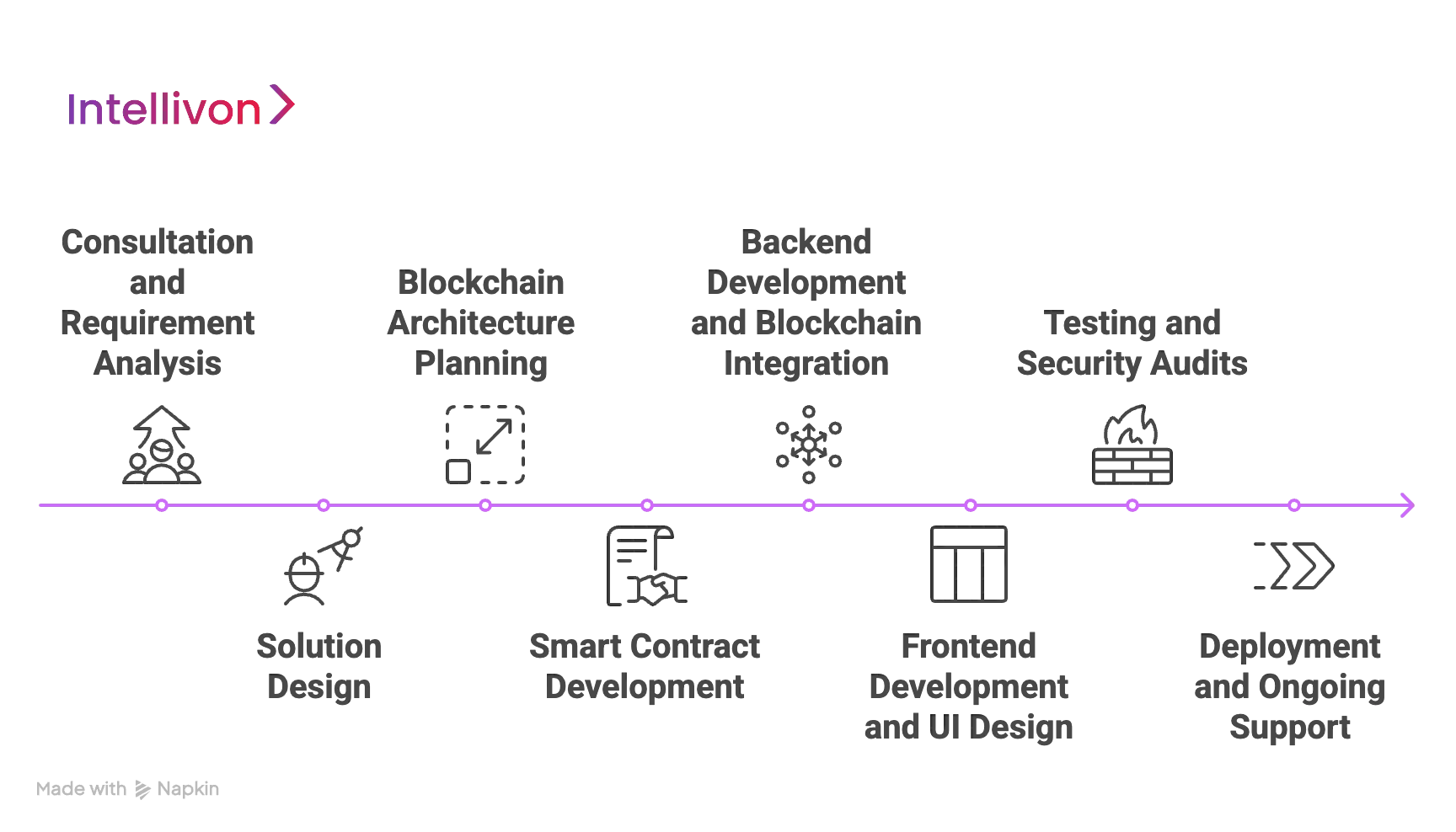
Step 1. Consultation and Requirement Analysis
Every project begins with a conversation. We work closely with your team to understand business challenges, goals, and compliance needs. Whether it’s cutting supply chain costs, improving financial transparency, or protecting sensitive records, this step ensures we’re aligned with your objectives from day one.
Step 2. Solution Design
Once goals are clear, we design a blockchain solution that fits. This means selecting the right platform for your industry, creating smart contracts to automate workflows, and ensuring data is stored securely. The focus is always on efficiency, cost savings, and seamless integration with your current systems.
Step 3. Blockchain Architecture Planning
Enterprises can’t afford short-term fixes. We design an architecture that is scalable, secure, and future-ready. That includes planning for integration with ERP or CRM systems, ensuring interoperability, and embedding strong security protocols. The result: a network that grows as your business grows.
Step 4. Smart Contract Development
Smart contracts are where automation happens. We build them to cut manual errors, reduce paperwork, and speed up execution. Every contract goes through rigorous security checks, so you can trust the system to run without risk.
Step 5. Backend Integration
Blockchain doesn’t live in isolation, since it has to work with your existing IT stack. We integrate it with your backend systems so data flows securely and consistently. That way, blockchain enhances operations instead of disrupting them.
Step 6. Frontend Development and User Experience
For adoption to succeed, users need simplicity. We design intuitive dashboards and interfaces so teams can track, verify, and act on data in real time — without needing to understand the technical complexity underneath.
Step 7. Testing and Security Audits
Before launch, we stress-test the solution under real-world conditions. Our team checks for performance, scalability, and security vulnerabilities. This ensures that your blockchain is battle-ready, compliant, and trustworthy before going live.
Step 8. Deployment and Ongoing Support
We deploy the solution on your chosen network and set up monitoring to track performance in real time. If issues arise, alerts and proactive support ensure fast resolution. As your enterprise scales, we help the blockchain system scale with it, keeping it reliable, secure, and cost-efficient long after launch.
With this step-by-step approach, we deliver a competitive edge, helping your enterprise move faster, reduce costs, and stay ahead in a digital-first world.
Overcoming Enterprise Blockchain Challenges: Strategies for Success
Adopting blockchain at an enterprise level isn’t without hurdles. Many projects stall due to unclear goals, integration headaches, or compliance risks. At Intellivon, we’ve seen these challenges firsthand, and we know how to help enterprises overcome them with practical, ROI-driven strategies.
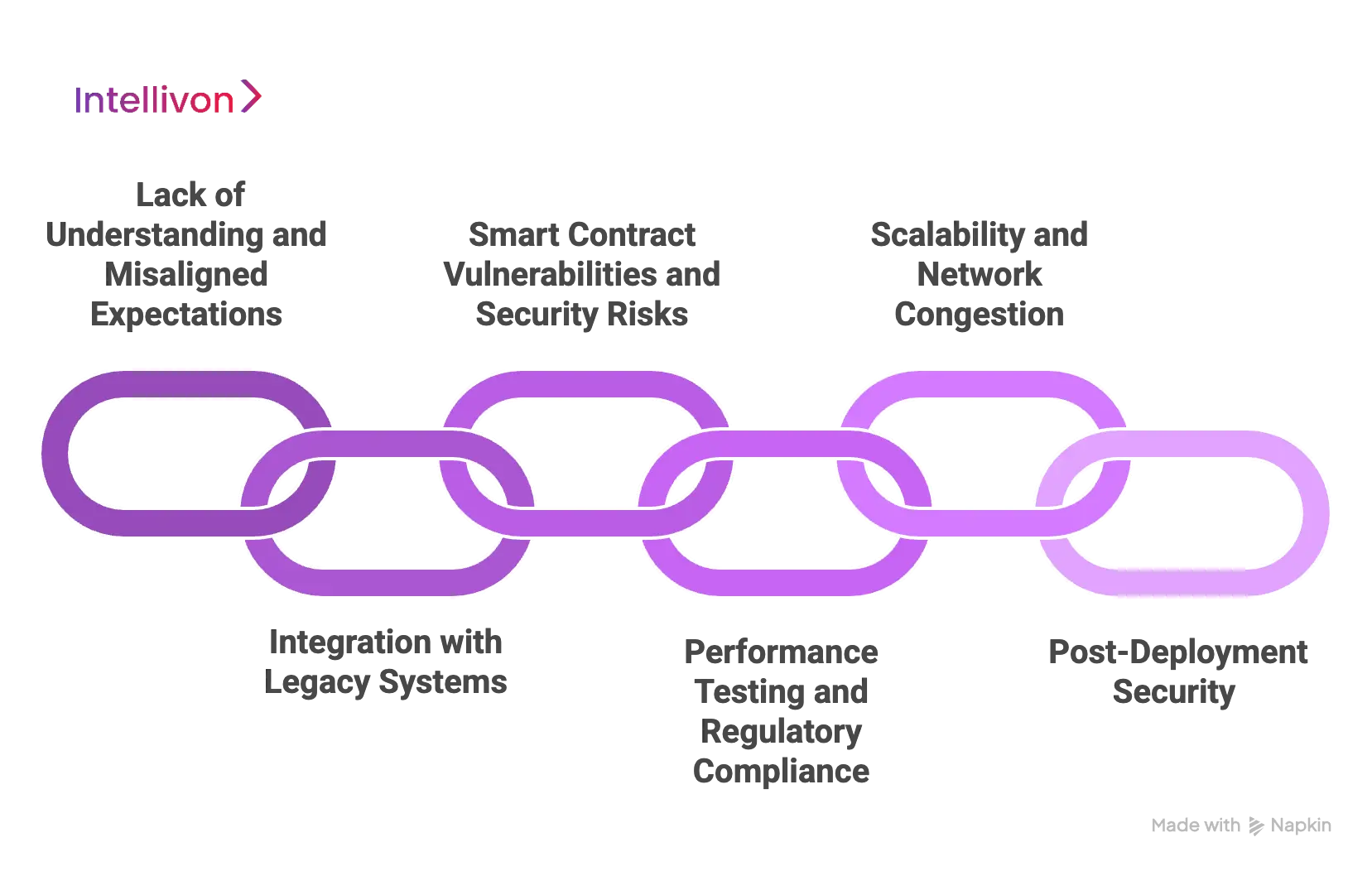
1. Lack of Understanding and Misaligned Expectations
Blockchain still feels abstract to many decision-makers. This often leads to overpromising or expecting quick wins that aren’t realistic. Misaligned expectations slow projects and frustrate stakeholders.
How We Solve It:
We start with discovery sessions and workshops. Your team learns what blockchain can realistically achieve, and where it delivers the most value. By aligning use cases with business goals early, we set a clear path forward.
2. Integration with Legacy Systems
Most enterprises already rely on complex ERP, CRM, and legacy platforms. Adding blockchain on top can cause delays, data inconsistencies, or costly rework if not handled carefully.
How We Solve It:
We build blockchain solutions that seamlessly integrate with existing systems. Our experts design middleware and connectors that let blockchain work quietly in the background. This ensures smoother rollouts without disrupting daily operations.
3. Smart Contract Vulnerabilities and Security Risks
Smart contracts bring automation but also risk. Poorly coded contracts have led to high-profile hacks and financial losses across industries. Enterprises can’t afford that.
How We Solve It:
We use audited frameworks and run rigorous security checks before launch. Every contract is stress-tested for vulnerabilities. The result? Faster automation with peace of mind, knowing your agreements can’t be tampered with.
4. Performance Testing and Regulatory Compliance
Enterprises operate in highly regulated environments. Whether it’s GDPR, HIPAA, or financial rules, compliance is non-negotiable. At the same time, blockchain networks must perform at scale without bottlenecks.
How We Solve It:
We design solutions that meet regulatory requirements from day one. Then, we simulate real-world transaction loads to ensure the system can scale. This gives enterprises confidence that blockchain will stay compliant, fast, and reliable.
5. Scalability and Network Congestion
As adoption grows, networks can slow down or become too costly to run. Without a scaling strategy, enterprises risk stalled projects or frustrated users.
How We Solve It:
We use scaling strategies like Layer-2 networks and private chains to handle growth. This keeps costs low and performance high, even with rising transaction volumes. You get a blockchain solution that grows with your business.
6. Post-Deployment Security
Launching blockchain isn’t the finish line. Cyber threats evolve, and many enterprises underestimate the need for continuous monitoring. Without it, downtime and vulnerabilities creep in.
How We Solve It:
We provide ongoing monitoring, security updates, and proactive issue resolution. With real-time alerts and dedicated support, enterprises avoid disruptions and keep operations running smoothly long after deployment.
With Intellivon, challenges don’t stall your blockchain journey. They become opportunities to future-proof operations, build trust, and deliver long-term ROI.
Top 5 Enterprises Leveraging Blockchain for Digital Transformation
Blockchain is transforming industries by improving transparency, security, and efficiency. Here are five leading enterprises that have successfully integrated blockchain into their operations, backed by data-driven results.
1. Walmart
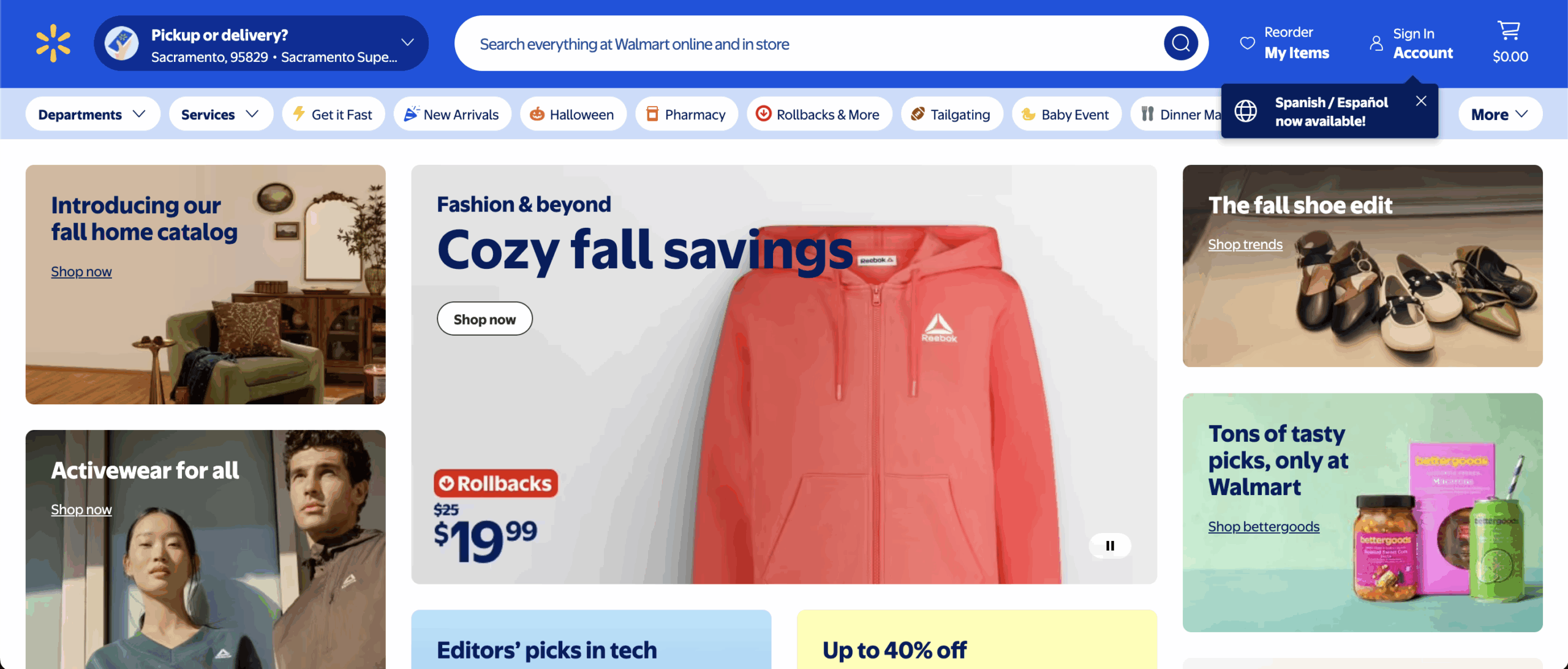
Industry: Retail
Blockchain Application: Supply Chain Management
Walmart has integrated IBM’s Food Trust Blockchain to enhance food traceability, reducing the time to trace products from 7 days to just 2.2 seconds. This system has improved food safety, reduced waste, and streamlined supply chain operations.
Over 25 products are now tracked, with plans for further expansion. The initiative covers more than 100 suppliers and has achieved a 50% reduction in recall times, resulting in improved consumer confidence and traceability.
2. JPMorgan Chase

Industry: Banking and Finance
Blockchain Application: Digital Payments and Asset Tokenization
By 2023, JPMorgan had processed over $1 trillion in transactions using JPM Coin. This has led to a 30% reduction in cross-border payment costs and significantly improved settlement times, making financial transactions more efficient.
3. IBM
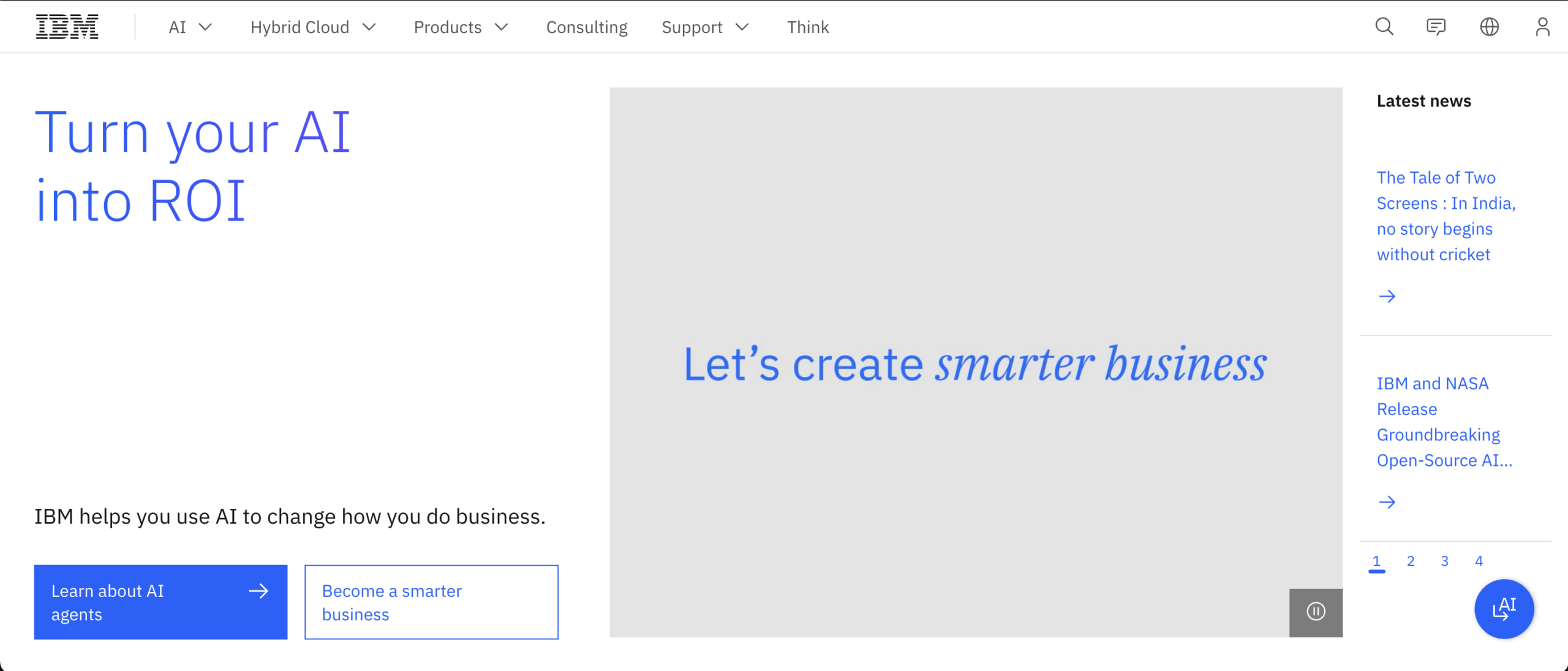
Industry: Technology
Blockchain Application: Supply Chain Solutions
IBM’s blockchain platform, Food Trust, is used by over 100 companies across the food, retail, and healthcare sectors to track products from farm to table. The platform has reduced traceability time from days to seconds and enhanced operational efficiency.
In 2023, it helped reduce food waste by 25%. The integration of blockchain in the supply chain has improved transparency, resulting in more efficient and reliable supply chain operations.
4. Nestlé
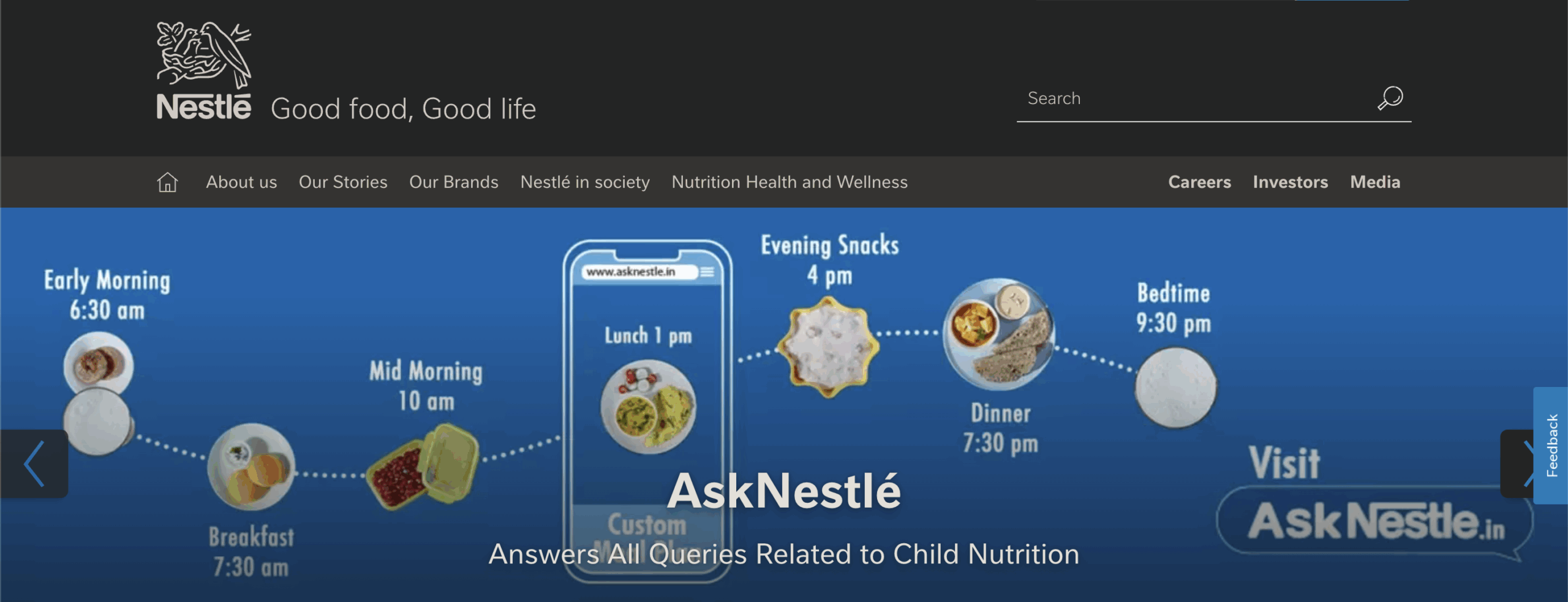
Industry: Food and Beverage
Blockchain Application: Supply Chain Transparency
Through the OpenSC platform, Nestlé uses blockchain to trace the origin of products like coffee and palm oil, ensuring ethical sourcing. Over 10,000 products are now traceable, with 50% of their palm oil supply chain verified for sustainability.
Nestlé’s commitment to transparency has boosted consumer confidence, with plans to provide 100% visibility of its supply chain by 2025, making it easier for consumers to trace the sustainability of the products they buy.
5. LVMH

Industry: Luxury Goods
Blockchain Application: Product Authentication
LVMH, in partnership with other luxury brands, created the Aura Blockchain Consortium to authenticate luxury products and prevent counterfeiting. Over 40 million luxury products have been verified on the blockchain, ensuring authenticity for high-end brands like Louis Vuitton and Fendi.
These enterprises illustrate how blockchain is transforming business operations across various industries, from improving supply chain efficiency to ensuring product authenticity. With blockchain’s growing adoption, the future of digital transformation is clearer than ever.
Conclusion
Blockchain is revolutionizing industries by enhancing transparency, security, and efficiency. Enterprises like Walmart, JPMorgan Chase, and IBM have successfully integrated blockchain to improve supply chains, streamline financial transactions, and ensure product authenticity.
As businesses continue to adopt this transformative technology, blockchain’s potential to drive innovation, reduce costs, and foster trust will only grow, helping enterprises thrive in an increasingly digital world.
Build Your Next Blockchain-Powered Enterprise Solution With Us
With our expertise in blockchain technology and a proven track record of successful enterprise implementations, we are the trusted partner for building customized blockchain solutions that deliver tangible business value.
Why Choose Us for Blockchain Solutions?
- Tailored Blockchain Architecture: Custom-designed to meet your business objectives and industry-specific needs.
- Seamless Integration: Smooth integration with your existing ERP, CRM, and legacy systems.
- Enterprise-Grade Security: Solutions built with top-tier security standards to protect your data and ensure compliance.
- Scalability for Growth: Blockchain solutions that grow with your business, supporting high transaction volumes and data complexity.
- Continuous Support & Training: Comprehensive training for your team and ongoing support to ensure smooth operation.
Our blockchain experts are ready to help you:
- Define your blockchain strategy and objectives.
- Design a tailored blockchain solution for your enterprise.
- Ensure compliance with industry regulations.
- Develop, test, and deploy your blockchain system.
Book a free consultation today to discuss how blockchain can revolutionize your business. Let’s build the secure, scalable, and future-ready blockchain solution your enterprise needs.
FAQ’s
Q1. What is the best blockchain platform for enterprises?
A1. It depends on your goals. Ethereum is great for automation, Hyperledger Fabric for private networks, Corda for finance, and XDC for trade finance.
Q2. How does blockchain improve supply chain management?
A2. It provides real-time traceability, reduces fraud, and speeds up issue resolution. Enterprises see 20–40% cost savings through fewer disputes and faster recalls.
Q3. Is blockchain secure enough for enterprises?
A3. Yes. Blockchain’s immutability and encryption protect data from tampering. Private, permissioned networks add extra safeguards for industries with strict compliance needs.
Q4. How do smart contracts add business value?
A4. They automate agreements and execute instantly when conditions are met. This reduces manual errors, lowers admin costs, and speeds up transactions across industries.
Q5. What are the biggest challenges in blockchain adoption?
A5. Enterprises struggle with legacy integration, unclear ROI, compliance, and scalability. The solution: custom design, regulatory alignment, and growth-ready architecture.
Q6. How quickly can enterprises see results?
A5. Most see impact within 3–6 months through automation and visibility improvements. ROI typically follows within a year, especially in high-cost, high-risk industries.

